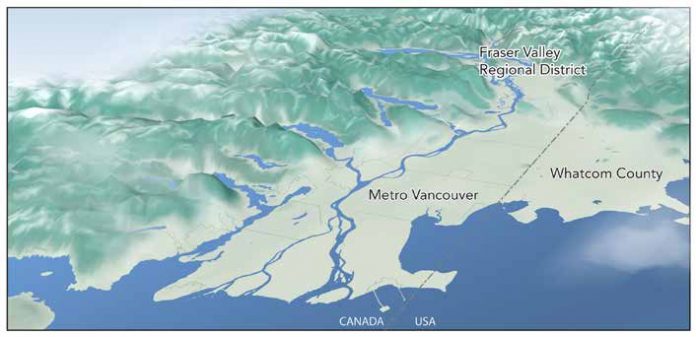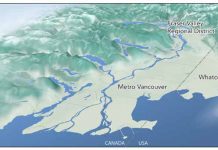METRO Vancouver on Friday issued an air quality advisory for eastern Metro Vancouver and the Fraser Valley Regional District because of high concentrations of ground-level ozone that are expected to persist for the next couple of days during the hot and sunny weather. The current weather forecast indicates hot temperatures through Saturday, with some cooling on Sunday.
Metro Vancouver is also monitoring conditions associated with wildfire smoke from fires burning in the interior of B.C. and Washington. Wildfire smoke models are forecasting that smoke from these fires may reach parts of Metro Vancouver and the Fraser Valley Regional District on Saturday and continuing in to Sunday. A change in the weather on Monday is forecast to bring onshore winds to help clear the smoke. Smoke concentrations may vary widely across the region as winds and temperatures change, and as wildfire behaviour changes.
Ground-level ozone is not emitted directly into the air. It is formed when nitrogen oxides (pollutants emitted when fuels are burned) and volatile organic compounds (emitted from solvents and other sources) react in the air in the presence of sunlight. The highest levels of ground-level ozone are generally observed between mid-afternoon and early evening on summer days.
Avoid strenuous outdoor activities during mid-afternoon to early evening, when ozone levels are highest, especially if breathing feels uncomfortable. Consider choosing easier outdoor activities, such as walking instead of running, where you don’t have to breathe as hard. Exposure is particularly a concern for people with underlying conditions such as lung disease, heart disease, chronic obstructive pulmonary disease (COPD) including bronchitis and emphysema, as well as asthma, and/or diabetes; individuals with respiratory infections such as COVID-19; pregnant women and infants; children; outdoor workers (e.g. construction and agricultural workers); and older adults. Individuals who are socially marginalized may also be at elevated risk (e.g. people who are experiencing homelessness or are underhoused).
It is also important to stay cool and hydrated. Indoor spaces with HEPA air cleaner filtration and air conditioning may offer relief from both heat and air pollution, but please observe any COVID-19 protocols. Consider creating a comfortable space at home with a portable air conditioner (if you do not have central air conditioning). If you are experiencing symptoms such as chest discomfort, shortness of breath, coughing or wheezing, seek prompt medical attention. Call 9-1-1 in the case of an emergency.
Metro Vancouver works in cooperation with Environment and Climate Change Canada, Fraser Valley Regional District and B.C. Ministry of Environment and Climate Change Strategy to look after air quality.
Information about real-time air quality readings for Metro Vancouver and Fraser Valley communities and potential health impacts can be found at www.airmap.ca and www.env.gov.bc.ca/epd/
To sign up for air quality alerts in your area, go to: www.metrovancouver.org/











